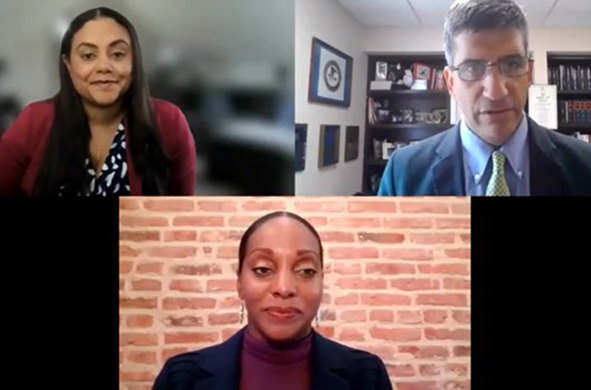Prof. Virelli talks SCOTUS ethics on ACS panel

Hours before a leaked U.S. Supreme Court opinion on Roe v. Wade sent shockwaves through the public sphere, a panel of legal experts that included Stetson Law Professor and constitutional law expert Louis J. Virelli III talked ethics standards on the high court and why they’re hard to enforce.
The American Constitution Society discussion focused heavily on recusals in light of calls for Supreme Court Justice Clarence Thomas’ recusal on cases involving his wife, activist Ginni Thomas, and her involvement in the events that took place at the U.S. Capitol on January 6th, 2021. The conversation was called “Supreme but not Immune: Creating a Binding Code of Ethics for Supreme Court Justices.” ACS president and former U.S. Senator from Wisconsin Russ Feingold called the controversy over Justice Thomas “the proverbial elephant in the room.”
“This is an egregious ethical lapse given the Thomases’ close connection as spouses and the existential threat to democracy that its offenders represent,” Feingold said.
The lack of a clear solution
The panel explored how to impose greater accountability to prevent ethical lapses among U.S. Supreme Court justices and why Congress has been limited in its ability to do so. There is, for example, a code of conduct for United States judges, but it doesn’t apply to Supreme Court justices.
“Supreme Court justices are not replaceable,” Virelli, a faculty advisor on Stetson Law’s student ACS chapter, said. “So when a Supreme Court justice is recused or recuses themselves, it changes the number and makeup of the court, and therefore you have a different institution.”
Congress can technically pass a law enforcing ethical standards, but as Virelli pointed out, there have been 18 proposed laws introduced that would have done this – and none have passed. Virelli said that every case the court hears has enough of its own nuances that a policy governing recusals and other ethical issues would be weak and unsatisfactory.
“My view is, the best way to do this is to focus on the due process clause and the equivalent of public shaming, where instead of saying a justice did or did not follow a legal standard, the justice is just wrong and being unethical,” he said.
Panelist Veronica Root Martinez, a professor of law at the University of Notre Dame Law School, who researches professional and organizational ethics, countered that public shaming won’t work in the current polarized media environment because of social media.
“I don’t think you can be a Supreme Court justice right now without choosing to ignore a lot of the commentary about you,” Martinez said.
The congressional route
Martinez said she supports congressional action, given how the state intervenes in many other instances of professional misconduct – and how Congress already determines the number of Supreme Court justices, what constitutes a quorum, and other factors. An enforceable ethics code might help improve public trust in the court, which is heavily damaged, she said.
“It is eroding the legitimacy of the court for people to continue to think the court is increasingly partisan,” Martinez said. “And whether that is or is not true, the lack of an ethics standard is contributing to the belief of the public that the court is just a partisan show that isn’t actually putting out objective and legitimate decisions. And that is bad for the rule of law, and that is bad for the country.”
If Congress can’t enforce ethical standards and the Supreme Court won’t do it on its own, the solution may need to be a creative one.
“I think the blame is in justices who are willing to be fast and loose with their ethical obligations. And I don’t know that we can fix that in a traditional legal way,” Virelli said.
While debate remained over how to create accountability, the panelists agreed that something needs to be done.
“We know that these issues have been percolating for some time,” said moderator Kimberly Humphrey, senior legislative counsel for the Alliance for Justice. “I do believe that it has gotten to a point where it can’t be ignored.”
See the panel discussion in its entirety.
Post date: May 5, 2022
Media contact: Kate Bradshaw
[email protected] | 727-430-1580